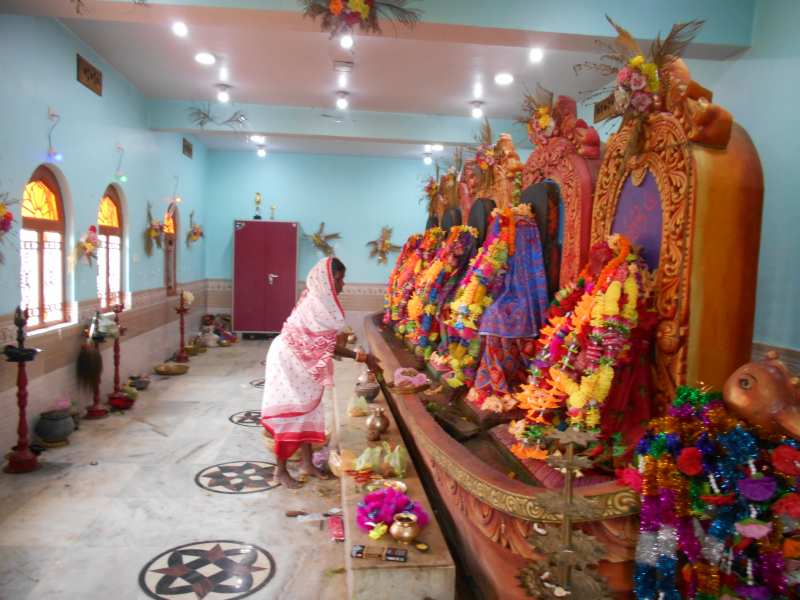Kendrapara: The demand for declaring the 500-year-old Maa Panchubarahi Temple at Rehabilitation Colony in Bagapatia under Rajnagar block in Kendrapara district as a tourist spot has gathered steam as locals believe that the Mother Goddess is a living deity and is the saviour for people during natural disasters.
Rarely anywhere in the state are women appointed as trustees of a temple. Similarly, it is uncommon to find women priestesses performing rituals in temples. However, at this famous Shakti Pitha, only women from Dalit communities are engaged as priestesses, while men are forbidden from touching the deities. The tradition has been followed for nearly 500 years which is not to be found anywhere. The five deities in this temple, built from black stone, are served by women priestesses without any formal government support. Locally cultivated grains, fruits, and, in some cases, financial contributions from devotees are accepted as offerings at this shrine.
Rashmita Sahoo, a local, said that the Mother Goddess is perceived as a living deity. “During natural disasters, or in times of happiness and sorrow, she is believed to fulfill the wishes of devotees,” she said. At some point, a male priest was given the responsibility of performing the rituals, but after he was besotted by the beauty of the sculpture, the priestly duties were returned to women.
Currently, the four Dalit women entrusted with priestly responsibilities are Sujata Dalei, Banalata Dalei, Rani Dalei, and Sabitri Dalei. Only married women are allowed to serve as priestesses, said Rashmita.
Read Also: Giant sea waves swallow centuries-old Panchubarahi temple in Kendrapara district
Nigamananda Rout, another local, said the Dalit women priestesses are highly respected in the village, with a tradition of villagers bowing at their feet. However, men are not permitted to enter the temple or touch the Panchubarahi deity.
Priestess Sabita Dalei shared that her mother-in-law, Sita Dalei, was a priest at the temple, and after her demise, she took on the mantle. No male devotees are allowed to participate in the rituals held Tuesdays, and they must view the deity from the temple’s walls through a narrow passage. Sabita Dalei feels content that no devotee has ever shown disrespect to her as a Dalit woman priestess.
Dr Sarbeswar Sen, a researcher, stated that the temple is unique in the state as Dalit women serve as priestesses here. “Only a few places in the country have female priestesses. Recently, Krishna Veni, S Ramya, and N Ranjitha were appointed as priestesses in the Sri Vaishnava Temple in Tamil Nadu. Additionally, temples like the Attukal Temple and Chakkulathukavu Temple in Kerala, Maa Bhagabati Temple in Tamil Nadu, and Mata Temple in Bihar also prohibit the entry of men.
Local resident Sudarshan Rout explains that the temple of the Mother Goddess was originally located near Barahipur in the Satabhaya Panchayat.
“However, due to coastal erosion, the deity had to be relocated. In 2020, the Mother Goddess was temporarily moved to Bagapatia, about 12 km from the original site where men were allowed to touch and transport the deity during the relocation,” he said.
Now, with the establishment of a new temple at Bagapatia, 571 families have been provided land and homes by the state government. Efforts are underway to recognise this temple as a religious tourism destination, with local political leaders and administration continuing their work on development plans.
PNN
